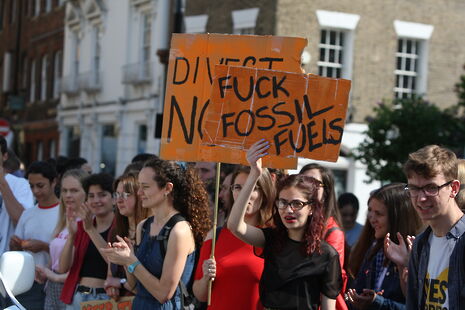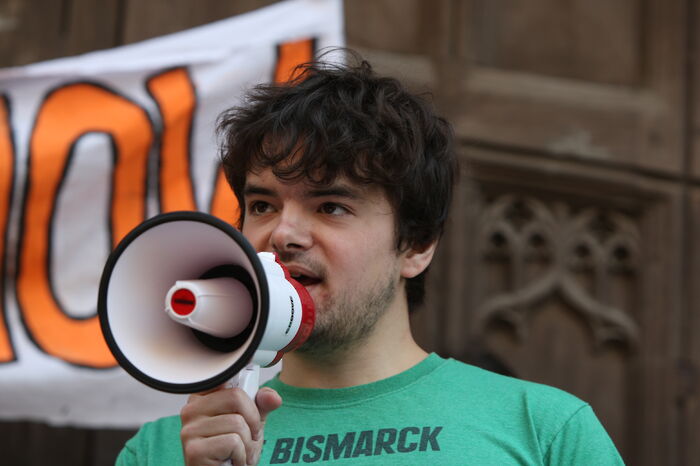Analysis: Working group report a landmark, but fails to understand the pro-divestment movement
The highly-anticipated report revealed a fundamental disconnect between University stakeholders

The divestment working group report was a year in the making. Setting out 19 recommendations to nudge Cambridge towards a future aligned with a vision of reform, it revealed members caught between two perspectives on the essentiality of divestment.
Vantage points between working group and campaigners differ in how they see climate change in relation to other issues of social change. For the working group, divestment is but one of a number of different ideals to be weighed up in a cost-benefit analysis of the University’s endowment. Campaigners, however, see it as seeping into other aspects of society.
The fact that the report raised, at one point, the impact of a 1% return on its endowment fund investments as corresponding to the funding of 100 scholarships, is telling. By quantifying the financial ramifications of divesting, the working group report ignored the intangible – the significance of Cambridge’s commitment to full divestment on an international level.
The dialogue between working group and campaigners has become a question of incompatible worldviews.
The report paints a picture of the working group’s reluctance to engage with the alternative perspective: either they did not consider campaigners’ demands realistic, or believed they were legitimate but failed to give them sufficient weight.
The working group most directly references students’ demands when it writes, “many of the calls for the University to divest completely from fossil fuel companies presupposed that such action was straightforwardly feasible and within the direct control of Council and the IO [Investment Office].”
Student concerns have been characterised as being a product of insufficient information.
The working group acknowledged calls from staff and students that it provide “increased and accurate information about the type of investments held by the University and other associated data”. Its hesitance to commit to the “difficult but not impossible” path to full divestment is indicative of a reluctance to take the convictions of its community as seriously as has been demanded.
The report attempts to give due weight to what it recognises as a concern about University members being kept in the dark about its investments, but misses the mark.

It fails to address adequately the fact that the pro-divestment argument in Cambridge accepts the premise that the University has limited control over its current investments, and that it is calling instead for Cambridge to take back control. Given a year’s worth of deliberation, the report pushes to the fore the question, how could the working group have so misinterpreted the crux of students’ arguments?
The report’s recommendations focus on how to work within existing structures. Those watching it are questioning those structures themselves. “Do you not think the University has a direct ethical responsibility to understand where its money is?”, one student asked Vice-chancellor Stephen Toope at the first open meeting held last term.
The solution advocated by the working group is to address the pro-divestment movement’s concerns by improving communications, recommending the introduction of an informative website and “appropriate updates” published to Regent House and on the University’s website.
There is a distinction between improving communication of what little information the Investment Office can provide about its operations, and addressing the opacity in those operations themselves.
Does the report adequately challenge the notion that fossil fuels industries are too big, and too profitable, to fail?
The way the working group has treated calls for transparency leaves the investments themselves unquestioned – yet this is precisely what students are rallying against. The fundamental concern with the lack of transparency is students not feeling uninformed, but ignored.
The report further misunderstands the main points of criticism which had emerged from revelations in the Paradise Papers. The report pinpoints that Cambridge’s use of offshore fundings was legitimate, but glosses over the more crucial revelation in the documents – University and college holdings in Coller International, whose investments are channelled principally into Royal Dutch Shell, were left unmentioned.
The choice of emphasis in the report begs the question: given its mischaracterisation of the divestment argument as solely the product of a pervasive lack of understanding within the university of the operations of the IO, has the group simply dismissed the views of the community?
The recommendations outlined for addressing calls for transparency push the picture of an evident vacuum between the two sides of the debate. The report recommends that the Investment Office “regularly report” to the University Council on how environmental and social concerns are incorporated and reflected in investment management practice, yet sets no standards to be met, leaving plenty of room for any who wish to take advantage of its vagueness.
There exists a glaring difference between communicating what little information the Investment Office provides about its operations and addressing the opacity in those operations themselves.
This disconnect culminates in the report’s ultimate response to the divestment debate: That the best path to climate justice is to direct the future of fossil fuels industries from the inside.
To truly engage with voices in the University’s wider community, it must more directly situate its recommendations with legitimate concerns posed by the pro-divestment movement.
The path forward, it states, should be joining the Institutional Investors Group on Climate Change (IIGCC), a body which works toward a low-carbon future by amplifying the investor voice and collaborating with policy makers, or an equivalent.
“The issues described here are larger than the University alone can resolve,” working group members wrote. Hinting at the scale of the problem, they then agreed that the best way forward was to leave the institutions that perpetuate those issues unchallenged.
Is this reformist enough to take the issue by storm, and does it adequately challenge the notion that fossil fuels industries are too big, and too profitable, to fail?
These recommendations of changes from the inside ignore the points that have been made throughout the debate, treating the urgency of the issue too lightly. Can we afford this solution given the harm we will continue to perpetuate in funding an industry that is causing demonstrable damage?
The good here does not alleviate the bad. The commitment to invest 10% of the University’s endowment in Environmental and Social Governance (ESG) funds is a step in the right direction, but in the meantime, it leaves unanswered whether it will see any tangible effect on the amount of the University’s endowment that is currently indirectly invested in fossil fuels. The working group, it seems, is looking ahead, but past the problem – the University’s presently held indirect investments in fossil fuels. They cannot ignore that it is precisely these investments which have been the core of the debate thus far.
The only quantified recommendation laid out in the report regarding the University’s indirect investments states that the University should “expect that no investment in thermal coal or tar sands be made by any party with whom it invests”.
The recommendation signals an unequivocal no to continuing investments in thermal coal and tar sands; even so, compared to its existing “negligible” investments in the most pollutive sources of energy, little has changed, marking an abject failure to break from past precedent. By only quantifying how the University will meet the bare minimum expected in its treatment of its indirect investment policy, the recommendation is inadequate in its failure to break from precedent.
Becoming, in the words of the working group report, the “credible and authoritative leader our community expects”, the working group must consider deeply whether their recommendation to push for a carbon-neutral future through working from within the fossil fuel industry adequately considered campaigners’ arguments.
The group’s overarching principle was to make the University “take urgent and tangible action to deliver a carbon neutral future”. Yet its approach has emerged as the latest development in what has been a consistent series of questions about the University’s internal democracy and whether its administration is listening to those challenging it, and taking them seriously.
Tension around the divestment debate was prolonged yesterday as questions remain as to how the Council will respond to the group’s recommendations.
To truly engage with voices in the University’s wider community, it must more directly situate its recommendations with legitimate concerns posed by the pro-divestment movement.
The expert opinion of working group members is only valuable insofar as it takes seriously the views of the people it is intended to represent. Even if it does not align with people’s concerns, it cannot be ignorant to them.
 News / Judge Business School advisor resigns over Epstein and Andrew links18 February 2026
News / Judge Business School advisor resigns over Epstein and Andrew links18 February 2026 News / Gov grants £36m to Cambridge supercomputer17 February 2026
News / Gov grants £36m to Cambridge supercomputer17 February 2026 News / Hundreds of Cambridge academics demand vote on fate of vet course20 February 2026
News / Hundreds of Cambridge academics demand vote on fate of vet course20 February 2026 News / CUCA members attend Reform rally in London20 February 2026
News / CUCA members attend Reform rally in London20 February 2026 News / Union speakers condemn ‘hateful’ Katie Hopkins speech14 February 2026
News / Union speakers condemn ‘hateful’ Katie Hopkins speech14 February 2026











